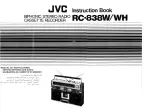
ENGLISH
11
Note:
Do not connect any other equipment while the device is switched
on. Switch off the other equipment as well before connecting it.
Only plug the device into the mains socket after you have connected
the external devices.
Connecting a television or flat screen
You have three options, depending on the sockets you have on your
television or flat screen:
– You get the best picture quality by making the connection at the
EURO-AV socket using a fully assigned EURO-AV cable.
– Connection via the cinch sockets Y, Pb/Cb and Pr/Cr (picture sig-
nals) and the AUDIO OUT cinch sockets (sound signals).
This connection (Progressive Scan) can also be used for projec-
tors.
– The standard connection for many devices, and one which provi-
des good quality, is via the S-VIDEO OUT socket and the AUDIO
OUT cinch sockets.
– The simplest option which still offers sufficient quality is connec-
ting to the video socket and the audio sockets with a cinch cable.
Necessary adjustments to the television or the
flat screen
After you have made the connections at the selected output sockets,
you must activate them. The setting procedure is described in the
”Selecting the video output socket (EURO AV/RGB or S-video)”
section on page 17.
If you make the connection using the cinch sockets Y, Pb/Cb and
Pr/Cr, please note the setting in the “Switching Progressive Scan
on/off” section on page 16.
If the DVD player is connected to a television set or a flat screen with
a 16:9 format, observe the settings described in the ”Selecting the
television format” section on page 18.
The colour standard of the DVD player must be matched to the
colour standard of your television or flat screen. The setting proce-
dure is described in the section ”Setting the TV system (TV norm)”
on page 17.
Connect the »
EURO AV
➞
TV
« socket directly to the television or
the flat screen, and not indirectly via a video recorder. This can
cause difficulties when playing back copy-protected DVDs/CDs.
CONNECTION AND PREPARATION
_












































